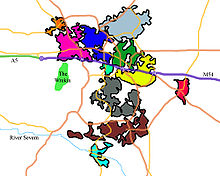Wellington, Shropshire
The first Shropshire Olympian Games, organised by celebrated Olympic revivalist Dr William Penny Brookes, were held in Wellington in May 1861.Located just 2.5 miles (4.0 km) from the centre of Wellington, it attracts tens of thousands of walkers and cyclists to the town every year.A short walk from the centre of the town is Sunnycroft, a Victorian villa and mini-estate now owned and run by the National Trust.The area's music and theatre groups host performances throughout the year, and there are craft markets at both Belmont Hall and Christ Church.Sounds in The Square brings live music to the heart of the town across weekends in July and August, and various concerts and fetes complete the programme.The Wellington Arts Festival runs every October, and offers a variety of events including plays, music, exhibitions, literature and poetry.The former cottage hospital was endowed in 1910 by Ann Bowring, in memory of her late husband John, a successful fish merchant and railway entrpreneur.[13] Wellington has road links, centrally located railway and bus stations, and a position on routes 45 and 81 of the National Cycle Network.[24] The town's literary claims to fame include it being the birthplace of 19th-century evangelical religious writer Hesba Stretton (1832–1911), and the first job of poet Philip Larkin (1922–1985) was as librarian of Wellington Library from 1943 to 1946.Larkin described Wellington as a "hole full of toad's turds" and stated that his job as town librarian was to "hand out tripey novels to morons".[26] Reverend Patrick Brontë lived in the town for a year while serving a curacy before moving to Yorkshire and meeting his future wife there, Maria Branwell.Several members of the pop group T'Pau, including vocalist Carol Decker and keyboardist Michael Chetwood, grew up in Wellington – the latter returning to run a music shop in the town.



SunnycroftCentral MosqueAll Saints ChurchShropshireOS grid referenceCivil parishUnitary authorityTelford and WrekinCeremonial countyRegionWest MidlandsCountryEnglandSovereign stateAdmastonBrattonDothillPost townPostcode districtDialling codePoliceWest MerciaAmbulanceUK ParliamentThe Wrekinmarket townTelfordShrewsburyM54 motorwayDomesday Booknew churchGeorge SteuartLord ForesterWilliam Penny BrookesNational Olympian AssociationManchesterApley Castlecounty surveyorThomas TelfordTelford Town CentrefootballTelford UnitedTelford and Wrekin Councilregister officeShropshire Hills Area of Outstanding Natural BeautyNational TrustAFC Telford UnitedWellington Cricket ClubWrekin CollegePrincess Royal Hospitalcottage hospitalBBC West MidlandsITV CentralWrekinBBC Radio ShropshireHits Radio Black Country & ShropshireGreatest Hits Radio Black Country & ShropshireCapital North West and WalesShropshire StarWellington railway stationtrain operating companiesAvanti West CoastLondon EustonTransport for WalesBirmingham InternationalAberystwythPwllheliHolyheadWest Midlands TrainsBirmingham New StreetWolverhamptonMarket DraytonWellington and Market Drayton RailwayBeeching AxeMuch WenlockStaffordrail head at DonningtonHadleyTrenchDonningtonNewportLondon MaryleboneWrexham & ShropshireArrivaMadeleyTelford CentreBridgnorthChaseriderWorld War IBirminghamMidlandsMidland Red NorthCowie GroupArriva MidlandsChatenay-MalabrytwinnedChâtenay-MalabryHesba StrettonPhilip LarkinPatrick BrontëMaria BranwellWilliam Witheringdigitalisheart diseaseCarol DeckerThomas LeighLord Mayor of LondonRichard BaxterGeorge DowningDowning College, CambridgeSir William ForesterAndrew PlimerEdward Pryce OwenRichard PadmoreLiberalHenry John GauntlettHenry GauntlettRobert William EytonJohn DicksonCecil Gordon LawsonLonsdale RaggArchdeacon of GibraltarDavid CranageDean of NorwichWilliam Allison WhiteVictoria Cross